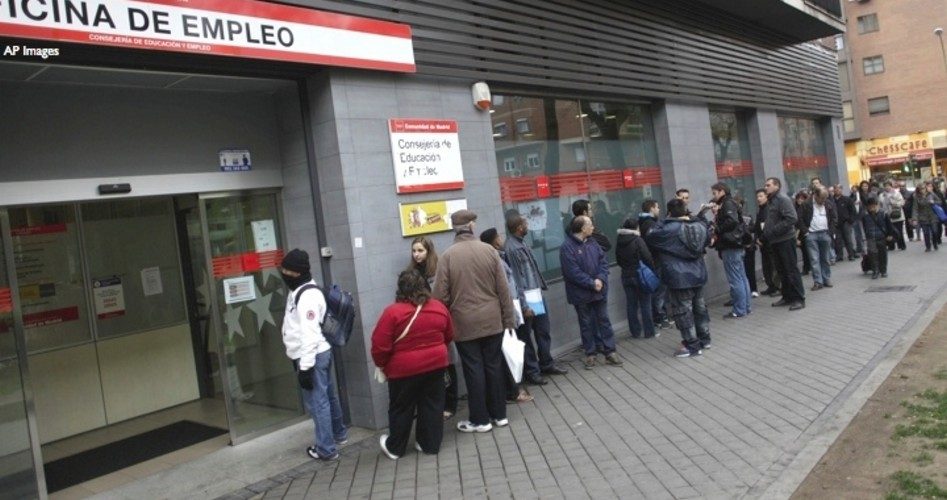
On Thursday, April 26th the Standard & Poor’s credit rating agency explained why it cut Spain’s sovereign debt rating by two notches:
We believe that the Kingdom of Spain’s budget trajectory will likely deteriorate…in contrast with our previous projections.
At the same time, we see an increasing likelihood that Spain’s government will need to provide further fiscal support to the banking sector.
In simpler terms Spain’s government continues to overspend, its banks are holding increasingly bad loans on real estate that threaten their existence, and the economy is declining and unemployment is setting new records. And so S&P, in its infinite wisdom, is keeping its rating on Spain’s government debt at investment grade levels while reducing them just two levels.
But, says Standard and Poor’s, their “negative long-term outlook…reflects our view of the significant risks to Spain’s economic growth and budgetary performance…” So S&P is reserving the right to issue further downgrades if things get worse, which it appears that they will.
Unemployment in Spain is the highest among industrialized economies at nearly 25 percent, with more than half of those under age 25 out of work and nearly 2 million households without a wage earner.
The economy is already in recession, which S&P acknowledged by forecasting negative growth of 1.5% this year, five times worse than they projected just three months ago. This is naturally resulting in declining personal disposable income and a shrinking demand for goods and services. Add to this similar difficulties faced by most of its trading partners and S&P is finally waking up to the reality that Spain is in serious trouble.
Revealingly, S&P has little optimism that things are going to change soon:
In our view, the strategy to manage the European sovereign debt crisis continues to lack effectiveness. We think credit conditions, and hence the economic outlook for Spain, could…deteriorate further than we anticipated earlier this year…
We have also considered a downside scenario that…could lead us to lower the ratings again…
The citizens in Spain and elsewhere have just about reached the breaking point. Riots in Madrid last week were a strong indicator. On April 20th the Dutch Prime Minister, Mark Rutte, was deposed.
In the Netherlands, Geert Wilders, the leader of the country’s third-largest political party, is resisting “diktats from Brussels,” adding that “We must be master of our own house.”
But the surprise run-off election this weekend in France between President Nicolas Sarkozy and hard-left Francois Hollande – with Hollande favored to win – is putting the entire question of continuing harsh austerity measures in order to balance the books on the backs of the citizens out in the open. Hollande is running on a platform that includes demands to renegotiate the European Monetary Union agreement and back off from the austerity being imposed on recalcitrant “sinner” nations. Said Hollande: “It’s not for Germany to decide for the rest of Europe. If I am elected president, there will be a change in Europe’s construction. We’re not just any country: we can change the situation.”
Those austerity measures are the ones being imposed on those states that spent more than they should have on growing government programs because the money was cheap and easy to get, and now are reluctant to mend their ways. But those measures are beginning to bite and their effects are beginning to be felt at the ballot box.
On May 6th Greece will be voting for a new parliament, and Italy goes to the polls for local elections. Germany’s state elections take place on May 31st, while Ireland is holding a referendum on the entire issue of Europe’s fiscal pact. In June France has its parliamentary elections and in September the Netherlands will go to the polls. The results are expected to put a significant damper on further austerity measures and are likely a result in a relaxation of those already imposed.
If Hollande wins it appears that he will have the sympathy of the leaders of other countries who are tired of EU demands and intrusions in return for loans to bail them out. As noted by Louise Armitstead of the Telegraph:
For three years, [German Chancellor Angela] Merkel and Sarkozy have imposed savage austerity with one overriding justification: to save the euro.
As if in wartime, democracy has been sidelined and public opinion ignored under the assumption that the state – or superstate – has a higher cause.
With breathtaking audacity, Brussels installed its own technocrats in Greece and Italy to impose its policies in “sinner states.” Extreme measures were needed to keep the Eurozone intact, they said – without ever properly asking if the electorate wanted the prize, let alone had the stomach for the cost of winning it.
Now, finally, the electorate is getting a chance to express itself. The election run-off in France this week and those following in quick succession should prove the point: back off!
Photo: People line up to enter a government employment benefit office in Madrid, Spain, April 27, 2012: AP Images



